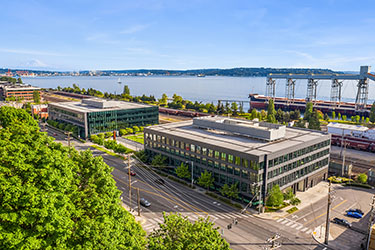|
Subscribe / Renew |
|
|
Contact Us |
|
| ► Subscribe to our Free Weekly Newsletter | |
| home | Welcome, sign in or click here to subscribe. | login |
Construction
| |
 |
May 11, 2023
Why Seattle has become a hotbed for life sciences
Martin Selig Real Estate

Zinkan
|
As Seattle continues to transform, the life sciences industry has helped buoy the commercial real estate market and has been a major driver in employment growth in the region. With a strong focus on research and development, Seattle has become a hub for biotech and pharmaceutical companies alike, drawing industry-leading talent from around the world. At Martin Selig Real Estate, we believe that this growth is amplified by the economic principle of agglomeration, offering some explanation as to why Seattle has become a hotbed for life sciences.
Agglomeration economies refer to the social and economic benefits derived by like-minded businesses choosing to co-locate in a particular geographic area. This concentration of industry can lead to increased productivity and innovation, benefiting employers in a number of ways including access to specialized talent, shared infrastructure, and knowledge spillover. These benefits are particularly strong in the life sciences industry, where collaboration and knowledge sharing are key drivers of success.
Sustainability is another desirable byproduct of agglomeration economies. The clustering of businesses in a particular industry reduces strain on utilities and infrastructure, while also reducing carbon emissions and transportation costs. Reducing costs to operate businesses frees up capital to invest into additional growth. Seattle can embrace the idea of agglomeration and foster continued economic growth by maintaining the city’s existing infrastructure, and investing in transportation methods that alleviate strain in our daily commutes.
In Seattle, agglomeration in the life sciences industry has been driven in large part by the presence of major research institutions such as the University of Washington, Fred Hutchinson Cancer Research Center, Seattle Cancer Care Alliance, and the Allen Institute for Brain Science. These institutions have built a solid foundation for life sciences in the region, attracting top talent and creating fertile ground for entrepreneurship in the life science industry.
As a real estate developer, we are keenly aware of the impact agglomeration economies can have on the Seattle market. We have seen firsthand how the concentration of businesses and talent in the life sciences industry has created demand for specialized workspaces, from lab facilities to supporting office space. We have also seen how the success of these companies has led to spin-off businesses and startups, further driving growth in the industry.
Our office portfolio at Martin Selig Real Estate is clustered in most of Seattle’s main commercial submarkets, making us well-suited to provide space for any business seeking adjacency to their industry peers. We provide flexible design options for all commercial spaces and are in the process of bolstering our portfolio-wide amenity spaces, such as conference rooms, fitness centers and communal areas, encouraging collaboration and knowledge sharing amongst our tenants.
Looking ahead, we believe that agglomeration economies existing in the life sciences will continue to drive growth and innovation in Seattle. With new breakthroughs in research and development on the horizon, we expect to see even greater demand for specialized commercial space in the years to come. Martin Selig Real Estate is committed to supporting Seattle’s emerging life science community by providing flexible lease terms and room to grow. As a family-owned operation for more than six decades, our approach emphasizes human interaction; a refreshing contrast to the increasingly automated world we live in.
Lauren Zinkan is the head of marketing and communications at Martin Selig Real Estate.
Other Stories:
- New chapter for life sciences starts in the U District
- Tepid appetite for local lab space continues
- What does it take to convert offices to biotech lab space?
- Best practices for successful outcomes to complex health care projects
- ‘Supersized’ team finds success at Seattle Children’s Forest B
- Wellness nestles in the trees at The Evergreen State College
- Transforming the care model in the Rogue Valley
- The evolution of science: trends affecting the science workplace
- Considerations for successful adaptive reuse projects



